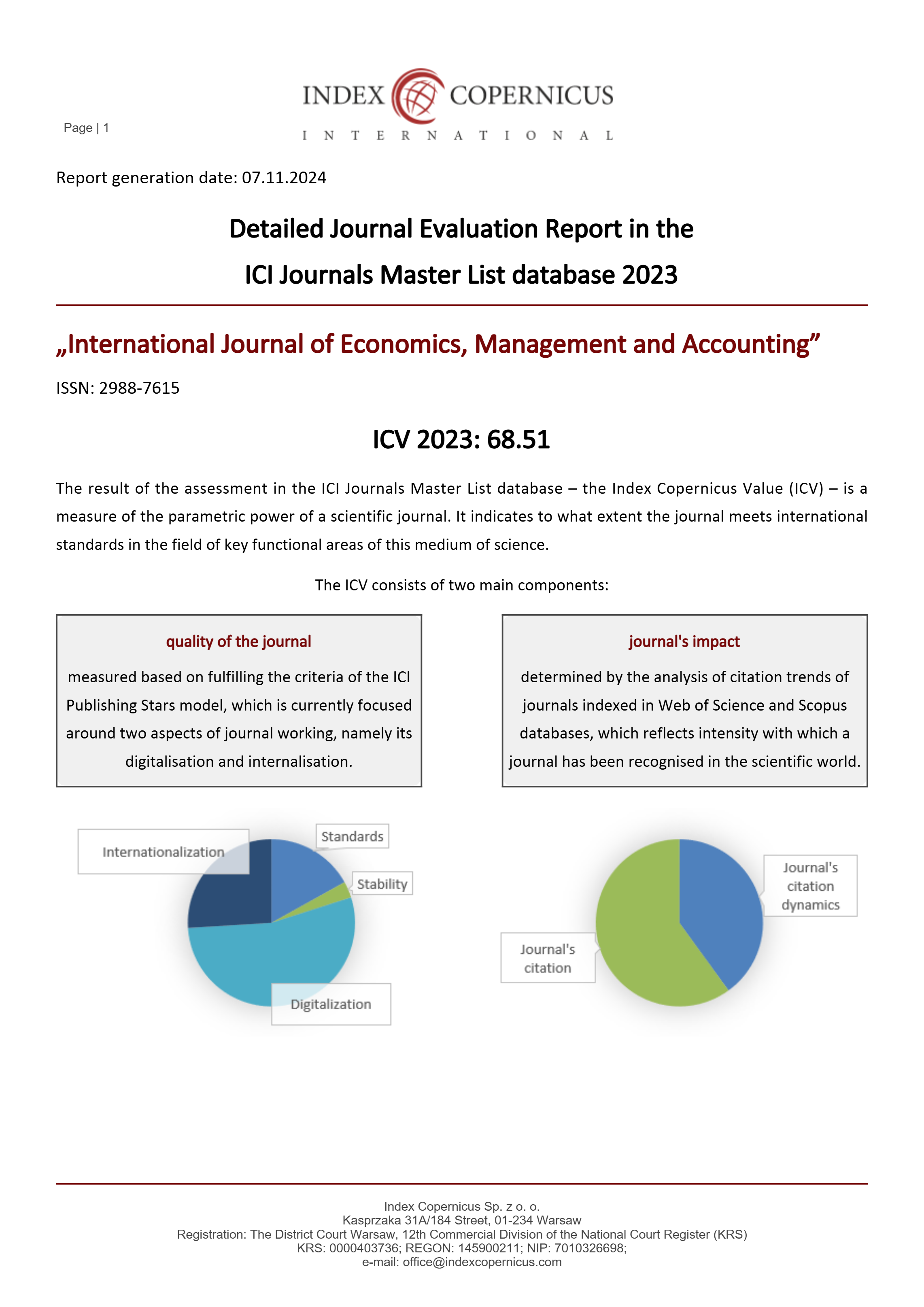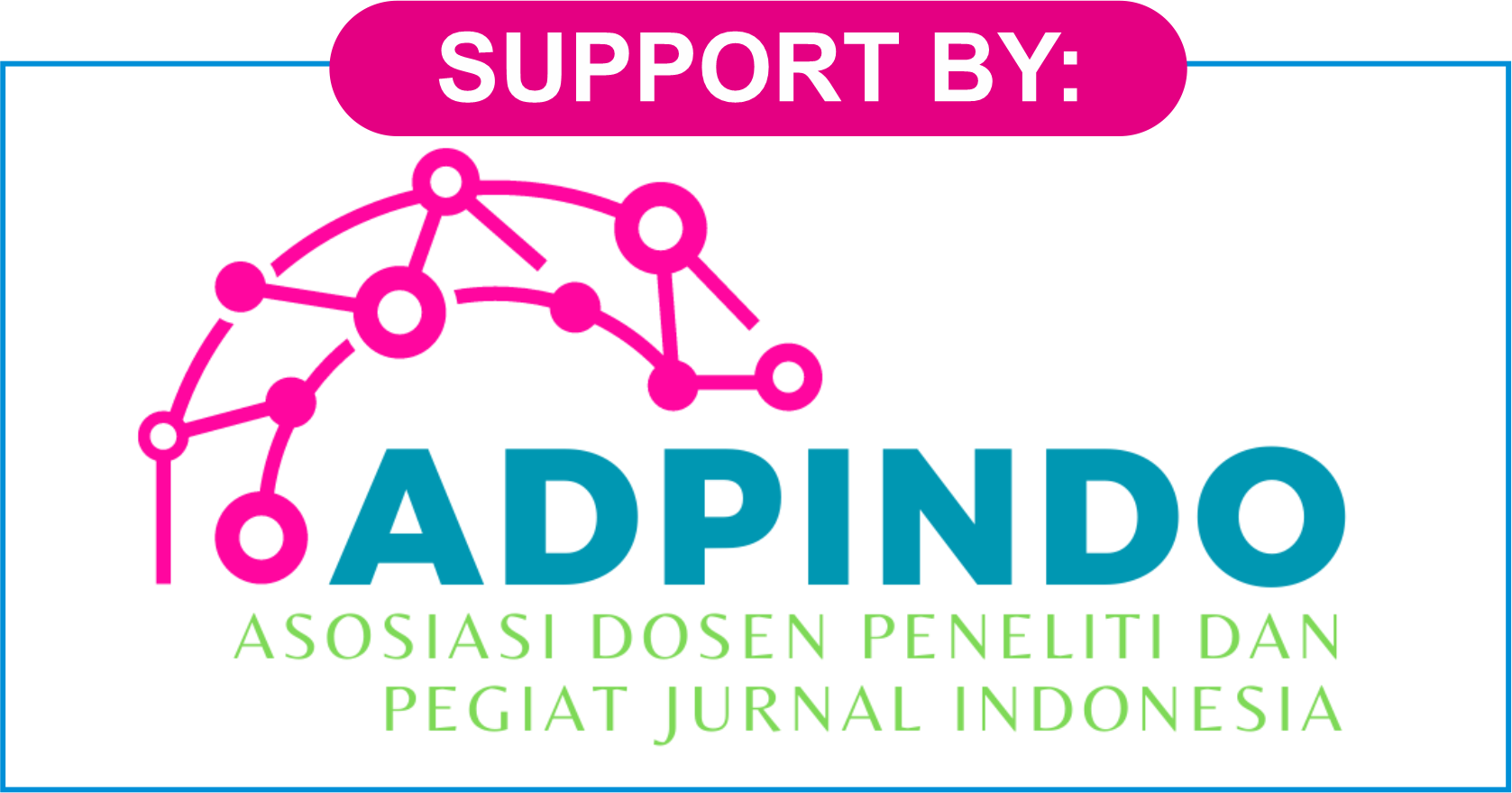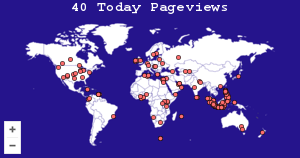MSME Sustainability Strategy Through the Application of Digital Marketing and Product Innovation in the VUCA Era: A Study of SMEs in Sukabumi City
DOI:
https://doi.org/10.47353/ijema.v3i4.346Keywords:
Digital Marketing, Product Innovation, Business Sustainability, SMEs, VUCAAbstract
This study aims to analyze the influence of digital marketing and product innovation on the sustainability of food MSMEs in Sukabumi City in facing the challenges of the VUCA (Volatility, Uncertainty, Complexity, Ambiguity) era. The research method used a quantitative approach with Structural Equation Modeling – Partial Least Square (SEM-PLS) analysis technique through the SmartPLS 4.0 application. The research sample consisted of 100 food MSME actors selected using purposive sampling. The results showed that digital marketing had a significant negative effect on business sustainability. This indicates that the implementation of digital marketing in MSMEs is not yet optimal and still requires more appropriate strategies for its utilization. Conversely, product innovation was found to have a positive and dominant effect on business sustainability. This means that the higher the MSME's ability to innovate, the greater their chances of surviving and growing. The R-Square value of 0.955 shows that digital marketing and product innovation can explain 95.5% of MSME business sustainability, while the rest is influenced by other factors outside the model. In conclusion, MSME business sustainability is largely determined by the ability to innovate, while digital marketing will only be effective if supported by products that are relevant, high-quality, and in line with consumer needs. This study contributes theoretically to the development of literature on SME digital adaptation in the context of VUCA, as well as practically by providing recommendations for SMEs, the government, and supporting institutions to enhance product innovation while optimizing digital marketing strategies in a sustainable manner.
Downloads
References
Ahmadian, H. et al. (2024) ‘Hybrid Models for Emotion Classification and Sentiment Analysis in Indonesian Language’, Applied Computational Intelligence and Soft Computing, 2024(1). Available at: https://doi.org/10.1155/2024/2826773.
Anand, A., Offergelt, F. and Anand, P. (2021) ‘Knowledge hiding – a systematic review and research agenda’, Journal of Knowledge Management, 26(6). Available at: https://doi.org/10.1108/jkm-04-2021-0336.
Anatan, L. and Nur (2023) ‘Micro, Small, and Medium Enterprises’ Readiness for Digital Transformation in Indonesia’, Economies, 11(6), p. 156. Available at: https://doi.org/10.3390/economies11060156.
Andersson, S. et al. (2022) ‘Sustainable development—Direct and indirect effects between economic, social, and environmental dimensions in business practices’, Corporate Social Responsibility and Environmental Management, 29(5), pp. 1158–1172. Available at: https://doi.org/10.1002/csr.2261.
Ayu Purnamawati, I.G., Yuniarta, G.A. and Jie, F. (2023) ‘Strengthening the role of corporate social responsibility in the dimensions of sustainable village economic development’, Heliyon, 9(4), p. e15115. Available at: https://doi.org/10.1016/j.heliyon.2023.e15115.
Bader, M. and Moshagen, M. (2025) ‘Assessing the fitting propensity of factor models.’, Psychological methods, 30(2), pp. 254–270. Available at: https://doi.org/10.1037/met0000529.
Bamel, N. et al. (2022) ‘The state of the art of innovation management: insights from a retrospective review of the European Journal of Innovation Management’, European Journal of Innovation Management, 27(3), pp. 825–850. Available at: https://doi.org/10.1108/ejim-07-2022-0361.
Bening, S.A. et al. (2023) ‘E-Commerce Technologies Adoption Strategy Selection in Indonesian SMEs Using the Decision-Makers, Technological, Organizational and Environmental (DTOE) Framework’, Sustainability, 15(12), p. 9361. Available at: https://doi.org/10.3390/su15129361.
Bruce, E. et al. (2023) ‘The Effect of Digital Marketing Adoption on SMEs Sustainable Growth: Empirical Evidence from Ghana’, Sustainability, 15(6), p. 4760. Available at: https://doi.org/10.3390/su15064760.
Calvez, V., Carrillo, J.A. and Hoffmann, F. (2020) ‘Uniqueness of stationary states for singular Keller–Segel type models’, Nonlinear Analysis, 205, p. 112222. Available at: https://doi.org/10.1016/j.na.2020.112222.
Carlos Rodríguez, J. et al. (2024) ‘Improving Natural Resource Management through AI: Quantitative Analysis using SmartPLS’, International Transactions on Artificial Intelligence (ITALIC), 2(2), pp. 135–142. Available at: https://doi.org/10.33050/italic.v2i2.548.
Chi, Z. et al. (2023) ‘Driving Circular Economy through Digital Technologies: Current Research Status and Future Directions’, Sustainability, 15(24), p. 16608. Available at: https://doi.org/10.3390/su152416608.
Christofi, M. et al. (2024) ‘Digital Transformation of SMEs: The Role of Entrepreneurial Persistence and Market Sensing Dynamic Capability’, IEEE Transactions on Engineering Management, 71, pp. 13598–13615. Available at: https://doi.org/10.1109/tem.2022.3230248.
Ciavolino, E. et al. (2021) ‘A confirmatory composite analysis for the Italian validation of the interactions anxiousness scale: a higher-order version’, Behaviormetrika, 49(1), pp. 23–46. Available at: https://doi.org/10.1007/s41237-021-00151-x.
Cong, L.W., Yang, X., and Zhang, X. (2024) ‘Small and Medium Enterprises Amidst the Pandemic and Reopening: Digital Edge and Transformation’, Management Science, 70(7), pp. 4564–4582. Available at: https://doi.org/10.1287/mnsc.2023.02424.
D’Almeida, A.P. and De Albuquerque, T.L. (2024) ‘Innovations in Food Packaging: From Bio-Based Materials to Smart Packaging Systems’, Processes, 12(10), p. 2085. Available at: https://doi.org/10.3390/pr12102085.
E-Vahdati, S., Wan-Hussin, W.N. and Ling, O.H. (2022) ‘Sustaining the Yellow Heart: responsible business by reducing inequalities at Digi Malaysia’, Emerald Emerging Markets Case Studies, 12(1), pp. 1–43. Available at: https://doi.org/10.1108/eemcs-10-2020-0362.
Farida, N. and Nuryakin, N. (2021) ‘Network capability, relational capability and Indonesian manufacturing SME performance: an empirical analysis of the mediating role of product innovation’, Engineering Management in Production and Services, 13(1), pp. 41–52. Available at: https://doi.org/10.2478/emj-2021-0003.
Firman, A. et al. (2022) ‘The impact of eco-innovation, ecotourism policy and social media on sustainable tourism development: evidence from the tourism sector of Indonesia’, Economic Research-Ekonomska Istraživanja, 36(2), pp. 1–21. Available at: https://doi.org/10.1080/1331677x.2022.2143847.
Fithri, P. et al. (2024) ‘Validation Studies a Questionnaire Developed to Measure Incubator Business Technology Performance using PLS-SEM Approach’, Andalasian International Journal of Applied Science, Engineering and Technology, 4(1), pp. 64–78. Available at: https://doi.org/10.25077/aijaset.v4i1.132.
Gaffar, V., Koeswandi, T.A.L. and Suhud, U. (2022) ‘Has the Covid-19 Pandemic Accelerated the Digital Transformation of Micro, Small and Medium-Sized Enterprises in Indonesia?’, Teorija in Praksa, pp. 729–744. Available at: https://doi.org/10.51936/tip.59.3.729-744.
Gupta, A. and Singh, R.K. (2022) ‘Managing Resilience of Micro, Small and Medium Enterprises (MSMEs) During COVID-19: Analysis of Barriers’, Benchmarking an International Journal, 30(6), pp. 2062–2084. Available at: https://doi.org/10.1108/bij-11-2021-0700.
Han, C. et al. (2023) ‘Intermediate-level outside-in marketing capabilities, technological innovation, and management innovation’, European Journal of Marketing, 57(5), pp. 1531–1559. Available at: https://doi.org/10.1108/ejm-11-2021-0833.
Harsanto, B. et al. (2023) ‘Sustainability Innovation in Small Medium Enterprises (SMEs): A Qualitative Analysis’, The Qualitative Report [Preprint]. Available at: https://doi.org/10.46743/2160-3715/2023.6193.
Hokmabadi, H., Rezvani, S.M.H.S. and Matos, C.A. d. (2024) ‘Business Resilience for Small and Medium Enterprises and Startups by Digital Transformation and the Role of Marketing Capabilities—A Systematic Review’, Systems, 12(6), p. 220. Available at: https://doi.org/10.3390/systems12060220.
Imtihansyah, R. et al. (2024) ‘The Impact of Parental Support on Performance Achievement through Achievement Motivation in Elite Athletes in South Kalimantan, Indonesia: A Cross-Sectional Study with Structural Equation Modeling Analysis’, Retos, 57, pp. 346–354. Available at: https://doi.org/10.47197/retos.v57.105996.
Karimi, J. and Walter, Z. (2021) ‘The Role of Entrepreneurial Agility in Digital Entrepreneurship and Creating Value in Response to Digital Disruption in the Newspaper Industry’, Sustainability, 13(5), p. 2741. Available at: https://doi.org/10.3390/su13052741.
Kesanakurti, P. et al. (2020) ‘Genome skimming and NMR chemical fingerprinting provide quality assurance biotechnology to validate Sarsaparilla identity and purity’, Scientific Reports, 10(1). Available at: https://doi.org/10.1038/s41598-020-76073-7.
Laila, N. et al. (2022) ‘The intention of small and medium enterprises’ owners to participate in waqf: the case of Malaysia and Indonesia’, International Journal of Islamic and Middle Eastern Finance and Management, 16(3), pp. 429–447. Available at: https://doi.org/10.1108/imefm-01-2022-0014.
Laldin, M.A. and Furqani, H. (2016) ‘Innovation versus Replication: Some Notes on the Approaches in Defining Shariah Compliance in Islamic Finance’, Al-Jami’ah: Journal of Islamic Studies, 54(2), p. 249. Available at: https://doi.org/10.14421/ajis.2016.542.249-272.
Latifah, S.W. and Soewarno, N. (2023) ‘The environmental accounting strategy and waste management to achieve MSME’s sustainability performance’, Cogent Business & Management, 10(1). Available at: https://doi.org/10.1080/23311975.2023.2176444.
Legate, A.E., Ringle, C.M., and Hair, J.F. (2023) ‘PLS‐SEM: A method demonstration in the R statistical environment’, Human Resource Development Quarterly, 35(4), pp. 501–529. Available at: https://doi.org/10.1002/hrdq.21517.
Lisdiono, P. et al. (2022) ‘Risk management practice, alliance management capability, and enterprise resilience: Findings from Indonesian state-owned enterprises’, Problems and Perspectives in Management, 20(1), pp. 190–202. Available at: https://doi.org/10.21511/ppm.20(1).2022.17.
Loviscek, V. (2021) ‘Triple Bottom Line toward a Holistic Framework for Sustainability: A Systematic Review’, Revista de Administração Contemporânea, 25(3). Available at: https://doi.org/10.1590/1982-7849rac2021200017.en.
Masrianto, A. et al. (2022) ‘Digital Marketing Utilization Index for Evaluating and Improving Company Digital Marketing Capability’, Journal of Open Innovation: Technology, Market, and Complexity, 8(3), p. 153. Available at: https://doi.org/10.3390/joitmc8030153.
Meng, J. et al. (2023) ‘How does digital transformation affect organizational sustainable performance: the mediating roles of supply chain agility and integration’, International Journal of Logistics Research and Applications, 28(8), pp. 860–885. Available at: https://doi.org/10.1080/13675567.2023.2257139.
Menne, F. et al. (2022) ‘Optimizing the Financial Performance of SMEs Based on Sharia Economy: Perspective of Economic Business Sustainability and Open Innovation’, Journal of Open Innovation: Technology, Market, and Complexity, 8(1), p. 18. Available at: https://doi.org/10.3390/joitmc8010018.
Minciu, M. et al. (2024) ‘Adaptive strategies and sustainable investments: navigating organizations through a VUCA environment in and after COVID-19’, Technological and Economic Development of Economy, 31(2), pp. 639–662. Available at: https://doi.org/10.3846/tede.2024.22058.
Mohamed Salleh, S. (2021) ‘A New Model of the Framework for the Influence of the Internet of Things (IoT) Usage on the Grassroots Innovators’ Sustainability’, ASM Science Journal, 14, pp. 1–15. Available at: https://doi.org/10.32802/asmscj.2020.763.
Mohd Dzin, N.H. and Lay, Y.F. (2021) ‘Validity and Reliability of Adapted Self-Efficacy Scales in Malaysian Context Using PLS-SEM Approach’, Education Sciences, 11(11), p. 676. Available at: https://doi.org/10.3390/educsci11110676.
Moorkens, J. et al. (2024) ‘Proposal for a Triple Bottom Line for Translation Automation and Sustainability’, The Journal of Specialised Translation, (41), pp. 2–25. Available at: https://doi.org/10.26034/cm.jostrans.2024.4706.
Munir, A.R. et al. (2023) ‘The impact of digital marketing and brand articulating capability for enhancing marketing capability’, International Journal of Data and Network Science, 7(1), pp. 65–72. Available at: https://doi.org/10.5267/j.ijdns.2022.12.005.
Najib, M. et al. (2021) ‘Leaders’ Support of Sustainable Innovation and Business Sustainability in Developing Countries: Evidence from Small and Medium Food Processing Enterprises’, Sustainability, 13(23), p. 13091. Available at: https://doi.org/10.3390/su132313091.
Nawi, N.C. et al. (2020) ‘Strategic Orientations and Absorptive Capacity on Economic and Environmental Sustainability: A Study among the Batik Small and Medium Enterprises in Malaysia’, Sustainability, 12(21), p. 8957. Available at: https://doi.org/10.3390/su12218957.
Nowacka, A. and Rzemieniak, M. (2021) ‘The Impact of the VUCA Environment on the Digital Competences of Managers in the Power Industry’, Energies, 15(1), p. 185. Available at: https://doi.org/10.3390/en15010185.
Nuseir, M. and Refae, G. El (2022) ‘The effect of digital marketing capabilities on business performance enhancement: Mediating the role of customer relationship management (CRM)’, International Journal of Data and Network Science, 6(2), pp. 295–304. Available at: https://doi.org/10.5267/j.ijdns.2022.1.008.
Prihandono, D. et al. (2024) ‘Digital transformation to enhance Indonesian SME performance: Exploring the impact of market competition and digital strategy’, Problems and Perspectives in Management, 22(2), pp. 103–113. Available at: https://doi.org/10.21511/ppm.22(2).2024.09.
Purba, M.I. et al. (2021) ‘The effect of digital marketing and e-commerce on financial performance and business sustainability of MSMEs during the COVID-19 pandemic in Indonesia’, International Journal of Data and Network Science, pp. 275–282. Available at: https://doi.org/10.5267/j.ijdns.2021.6.006.
Ramadan, M. et al. (2023) ‘Toward Digital Transformation and Business Model Innovation: The Nexus between Leadership, Organizational Agility, and Knowledge Transfer’, Administrative Sciences, 13(8), p. 185. Available at: https://doi.org/10.3390/admsci13080185.
Rumanti, A.A. et al. (2022) ‘Innovation Capability and Open Innovation for Small and Medium Enterprises (SMEs) Performance: Response in Dealing with the COVID-19 Pandemic’, Sustainability, 14(10), p. 5874. Available at: https://doi.org/10.3390/su14105874.
Sarfo, C., Fakhar Manesh, M., and Caputo, A. (2024) ‘Exploitative and exploratory search: Dynamic capabilities enhancing SME adaptation, new product development, and environmental performance’, Journal of Small Business Management, 63(5), pp. 1–30. Available at: https://doi.org/10.1080/00472778.2024.2418026.
Sari, R.K., Alfarizi, M., and Ab Talib, M.S. (2024) ‘Sustainable strategic planning and management influence on sustainable performance: findings from halal culinary MSMEs in Southeast Asia’, Journal of Modelling in Management, 19(6), pp. 2034–2060. Available at: https://doi.org/10.1108/jm2-12-2023-0324.
Setiadi, S. et al. (2025) ‘Sustainable nature tourism transformation: The strategic role of green tourism in West Java’, Edelweiss Applied Science and Technology, 9(3), pp. 1544–1569. Available at: https://doi.org/10.55214/25768484.v9i3.5599.
Sharabati, A.-A.A. et al. (2024) ‘The Impact of Digital Marketing on the Performance of SMEs: An Analytical Study in Light of Modern Digital Transformations’, Sustainability, 16(19), p. 8667. Available at: https://doi.org/10.3390/su16198667.
Subhaktiyasa, P. (2024) ‘PLS-SEM for Multivariate Analysis: A Practical Guide to Educational Research using SmartPLS’, EduLine: Journal of Education and Learning Innovation, 4(3), pp. 353–365. Available at: https://doi.org/10.35877/454ri.eduline2861.
Sultoni, M.H. et al. (2022) ‘Digital marketing, digital orientation, marketing capability, and information technology capability on marketing performance of Indonesian SMEs’, International Journal of Data and Network Science, 6(4), pp. 1381–1388. Available at: https://doi.org/10.5267/j.ijdns.2022.5.013.
Tang, L. et al. (2024) ‘Building a committed workforce: the synergistic effects of coaching leadership, organizational self-esteem, and learning goal orientation.’, Frontiers in psychology, 15. Available at: https://doi.org/10.3389/fpsyg.2024.1423540.
Tiitu, M. et al. (2021) ‘Transcending sectoral boundaries? Discovering built-environment indicators through knowledge co-production for enhanced planning for well-being in Finnish cities’, Environmental Science & Policy, 126, pp. 177–188. Available at: https://doi.org/10.1016/j.envsci.2021.09.028.
Trivedi, K. and Srivastava, K.B.L. (2022) ‘The role of knowledge management processes in leveraging competitive strategies to achieve firm innovativeness’, The Bottom Line, 35(2/3), pp. 53–72. Available at: https://doi.org/10.1108/bl-06-2021-0071.
Trueba‐Castañeda, L., Torre‐Olmo, B. and Somohano‐Rodríguez, F.M. (2024) ‘Does digitalisation enable small and medium‐sized enterprises to become more sustainable?’, Corporate Social Responsibility and Environmental Management, 31(5), pp. 4893–4909. Available at: https://doi.org/10.1002/csr.2838.
Tseng, M.-L. et al. (2023) ‘Causality of circular supply chain management in small and medium-sized enterprises using qualitative information: a waste management practices approach in Indonesia’, Annals of Operations Research [Preprint]. Available at: https://doi.org/10.1007/s10479-023-05392-5.
Udayana, A.A.G.B. et al. (2024) ‘Investigating the role of e-commerce application and digital marketing implementation on the financial and sustainability performance: An empirical study on Indonesian SMEs ’, International Journal of Data and Network Science, 8(1), pp. 167–178. Available at: https://doi.org/10.5267/j.ijdns.2023.10.007.
Xu, Tingting et al. (2023) ‘Scalable and interfacial gap‐free mixed matrix membranes for efficient anion separation’, AIChE Journal, 70(2). Available at: https://doi.org/10.1002/aic.18242.
Yang, D. (2023) Design for environmentally sustainable furniture systems – the knowledge and know-how of furniture life cycle design and furniture sustainable product-service system design. Taylor & Francis.
Yanto, H. et al. (2022) ‘The Roles of Entrepreneurial Skills, Financial Literacy, and Digital Literacy in Maintaining MSMEs during the COVID-19 Pandemic’, Asian Economic and Financial Review, 12(7), pp. 504–517. Available at: https://doi.org/10.55493/5002.v12i7.4535.
Zhang, X. and Wu, H. (2024) ‘Investigating Structural Model Fit Evaluation’, Structural Equation Modeling: A Multidisciplinary Journal, 31(5), pp. 863–881. Available at: https://doi.org/10.1080/10705511.2024.2350023.
Downloads
Published
How to Cite
Issue
Section
License
Copyright (c) 2025 Rizky Maulana, Alhidayatullah, Sandi Setiadi

This work is licensed under a Creative Commons Attribution 4.0 International License.











